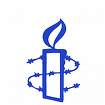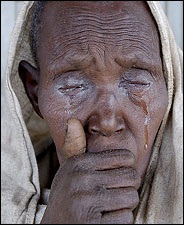Amnesty international: Alemayehu Fantu tortured by government agents using electric shock treatment
Also in the news: Trial update / October 13, 2006, Kinijit Support Groups Calgary, Vancouver and Winnipeg seven point agreement, Africa's Lagging Development--'Why Are They Poor?', AIDS hotline answers 70,000 calls each month and more of today's top stories
Trial Update
(ETP - Paulos Dandego) the Second Circuit Federal High Court has declined the request of defendants Kassahu Kebede (chairperson of the Addis Ababa branch of Ethiopian Teachers' Association), Daniel Bekele (policy manager at ActionAid Ethiopia ) and Netsanet demisse (head of the Organization for Social Justice in Ethiopia). They had protested against the prosecutions attempt to introduce additional “evidence”.
Amnesty international: Alemayehu Fantu tortured
 Alemayehu Fantu, the owner of a chain of supermarkets, was arrested by the Ethiopian police on 5 October and taken to Woreda 8 Police Station in the Gulele district of Addis Ababa.
Alemayehu Fantu, the owner of a chain of supermarkets, was arrested by the Ethiopian police on 5 October and taken to Woreda 8 Police Station in the Gulele district of Addis Ababa.
He is being held incommunicado without charge, and reports indicate that he has been tortured. Alemayehu Fantu was brought before a court on 6 October, and was remanded in custody without charges being brought against him. When he appeared in court again on 12 October, witnesses reported that he could barely walk.
There were clear signs that he had been tortured, such as bruises and marks on his feet. Sources indicate he may have received electric shocks. Amnesty International is extremely concerned that Alemayehu Fantu is at risk of further torture in detention. Almayehu Fantu’s family has been allowed to send him food but not to see him. He has received no visits and has not had access to legal advice. (More...)
-Also read EthioZagol's first report on this issue.
Kinijit Support Groups Calgary, Vancouver and Winnipeg seven point agreement: press release
Kinijit Support Groups in Canada held a discussion teleconference on October 9 2006 present at the meeting were Kinijit Support Groups from Calgary, Vancouver and Winnipeg.
Guests invited were .Ato Andargachew Tsige and Ato Berhane Mewa members of the Kinijit International Leadership .
The meeting lasted around two hours Ato Andargachew Tsige and Ato Berhane Mewa gave the support groups a briefing on the current situation in Ethiopia, Kinijit International Leadership, AFD and most importantly what Kinijit Support Groups should do to help Kinijit’s struggle for democracy in Ethiopia.(More...)
Africa's Lagging Development--'Why Are They Poor?'
by Jason Beaubien
 (This series examines how armed conflict, poor agricultural practices, disease, lousy governments and foreign trade practices contribute to making Africa the poorest continent in the world, ETP will post all articles in this series)
(This series examines how armed conflict, poor agricultural practices, disease, lousy governments and foreign trade practices contribute to making Africa the poorest continent in the world, ETP will post all articles in this series)
I was driving with my 3-year-old son through Guguletu, a township on the outskirts of Cape Town, South Africa. Shacks cobbled together out of wooden boards, sheet metal, plastic sheeting and other materials stretched as far as we could see. Open sewers spilled refuse into larger ditches along the road. Outhouses teetered in the mud. In one of the richest cities in Africa, kids were hauling water in jerry cans from communal taps.
"Why are they poor, Dada?"
I wished I had an answer. It was a question that nagged at me for the four years I covered Africa. All over the continent, I'd ask myself: Why is this the poorest continent on Earth? What is it that's caused this and why isn't it changing?
This series attempts to look at some of the issues contributing to poverty in Africa. There are others -- the legacy of colonialism, debt, racism. This series doesn't offer all the answers but rather it tries to look at a few of the factors that perpetuate poverty the continent.
There has been progress in parts of Africa in recent years on some issues. Economic growth in Angola and Mozambique has been impressive. Primary school enrollment in Malawi has jumped dramatically since 1991.
But the macro-view of Africa remains troubling. And as developing nations in Asia and Latin America play a greater role in the world economy, Africa is at risk of being left behind -- even among Third World countries.
On many key development indicators sub-Saharan Africa has stagnated or, even worse, is moving backwards. Life expectancy is falling. HIV continues to spread. Incidents of tuberculosis and malaria are on the rise.
Over the next 10 years, the World Bank predicts that the number of severely malnourished children in sub-Saharan Africa will increase. Infant mortality rates have dipped recently but are still five times higher than in Latin America.
Africa has the highest population growth rate in the world and the worst rate of educating those children. Currently this continent, where the main source of revenue is agriculture, isn't producing enough food to feed its own people. To make things worse, food production per capita in Africa is declining.
Africans lack access to clean drinking water, sanitation and health facilities at rates unheard of in other regions.
Why is this?
"Why are they poor?" as my 3-year-old would say. (to be continued...tomorrow)
-Ibis sighted in Ethiopia for first time since 1970s
-U.K. army chief urges Iraq pullout
-U.S. finds no radiation in initial N. Korea air sample
-Tiny fossils reveal inner secrets
-Gibson says ‘Passion’ criticism triggered tirade
-Kramnik is world chess champion
-Group challenges Madonna adoption
Trial Update
(ETP - Paulos Dandego) the Second Circuit Federal High Court has declined the request of defendants Kassahu Kebede (chairperson of the Addis Ababa branch of Ethiopian Teachers' Association), Daniel Bekele (policy manager at ActionAid Ethiopia ) and Netsanet demisse (head of the Organization for Social Justice in Ethiopia). They had protested against the prosecutions attempt to introduce additional “evidence”.
Amnesty international: Alemayehu Fantu tortured
 Alemayehu Fantu, the owner of a chain of supermarkets, was arrested by the Ethiopian police on 5 October and taken to Woreda 8 Police Station in the Gulele district of Addis Ababa.
Alemayehu Fantu, the owner of a chain of supermarkets, was arrested by the Ethiopian police on 5 October and taken to Woreda 8 Police Station in the Gulele district of Addis Ababa.He is being held incommunicado without charge, and reports indicate that he has been tortured. Alemayehu Fantu was brought before a court on 6 October, and was remanded in custody without charges being brought against him. When he appeared in court again on 12 October, witnesses reported that he could barely walk.
There were clear signs that he had been tortured, such as bruises and marks on his feet. Sources indicate he may have received electric shocks. Amnesty International is extremely concerned that Alemayehu Fantu is at risk of further torture in detention. Almayehu Fantu’s family has been allowed to send him food but not to see him. He has received no visits and has not had access to legal advice. (More...)
-Also read EthioZagol's first report on this issue.
Kinijit Support Groups Calgary, Vancouver and Winnipeg seven point agreement: press release
Kinijit Support Groups in Canada held a discussion teleconference on October 9 2006 present at the meeting were Kinijit Support Groups from Calgary, Vancouver and Winnipeg.
Guests invited were .Ato Andargachew Tsige and Ato Berhane Mewa members of the Kinijit International Leadership .
The meeting lasted around two hours Ato Andargachew Tsige and Ato Berhane Mewa gave the support groups a briefing on the current situation in Ethiopia, Kinijit International Leadership, AFD and most importantly what Kinijit Support Groups should do to help Kinijit’s struggle for democracy in Ethiopia.(More...)
Africa's Lagging Development--'Why Are They Poor?'
by Jason Beaubien
 (This series examines how armed conflict, poor agricultural practices, disease, lousy governments and foreign trade practices contribute to making Africa the poorest continent in the world, ETP will post all articles in this series)
(This series examines how armed conflict, poor agricultural practices, disease, lousy governments and foreign trade practices contribute to making Africa the poorest continent in the world, ETP will post all articles in this series)I was driving with my 3-year-old son through Guguletu, a township on the outskirts of Cape Town, South Africa. Shacks cobbled together out of wooden boards, sheet metal, plastic sheeting and other materials stretched as far as we could see. Open sewers spilled refuse into larger ditches along the road. Outhouses teetered in the mud. In one of the richest cities in Africa, kids were hauling water in jerry cans from communal taps.
"Why are they poor, Dada?"
I wished I had an answer. It was a question that nagged at me for the four years I covered Africa. All over the continent, I'd ask myself: Why is this the poorest continent on Earth? What is it that's caused this and why isn't it changing?
This series attempts to look at some of the issues contributing to poverty in Africa. There are others -- the legacy of colonialism, debt, racism. This series doesn't offer all the answers but rather it tries to look at a few of the factors that perpetuate poverty the continent.
There has been progress in parts of Africa in recent years on some issues. Economic growth in Angola and Mozambique has been impressive. Primary school enrollment in Malawi has jumped dramatically since 1991.
But the macro-view of Africa remains troubling. And as developing nations in Asia and Latin America play a greater role in the world economy, Africa is at risk of being left behind -- even among Third World countries.
On many key development indicators sub-Saharan Africa has stagnated or, even worse, is moving backwards. Life expectancy is falling. HIV continues to spread. Incidents of tuberculosis and malaria are on the rise.
Over the next 10 years, the World Bank predicts that the number of severely malnourished children in sub-Saharan Africa will increase. Infant mortality rates have dipped recently but are still five times higher than in Latin America.
Africa has the highest population growth rate in the world and the worst rate of educating those children. Currently this continent, where the main source of revenue is agriculture, isn't producing enough food to feed its own people. To make things worse, food production per capita in Africa is declining.
Africans lack access to clean drinking water, sanitation and health facilities at rates unheard of in other regions.
Why is this?
"Why are they poor?" as my 3-year-old would say. (to be continued...tomorrow)
Today's Top Stories
-AIDS hotline in Ethiopia answers 70,000 calls each month-Ibis sighted in Ethiopia for first time since 1970s
-U.K. army chief urges Iraq pullout
-U.S. finds no radiation in initial N. Korea air sample
-Tiny fossils reveal inner secrets
-Gibson says ‘Passion’ criticism triggered tirade
-Kramnik is world chess champion
-Group challenges Madonna adoption